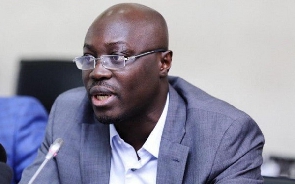 Ranking Member of the Finance Committee of Parliament, Caissel Ato Forson
Ranking Member of the Finance Committee of Parliament, Caissel Ato Forson
The Ranking Member of the Finance Committee of Parliament, Caissel Ato Forson, has said President Nana Addo Dankwa Akufo-Addo and the New Patriotic Party should be voted out because of the growing public sector debt under their watch.
Ghana’s total public debt increased by US$300 million in March 2020 to US$43.4 billion, the latest March 2020 Bank of Ghana Summary of Economic and Financial Data has revealed.
This debt is more than half the total size of the country's economy. In cedi terms, the nation’s debt jumped from GHS228.4 billion in February 2020 to GHS236.1 billion in March 2020, about 59.3% of Gross Domestic Product.
The external debt component was US$22.9 billion (GHS124.8 billion), representing 31.4% of the total debt. The domestic debt component was GHS111.3 billion, representing 28% of GDP. In December 2016, Ghana’s debt was GHS122, representing about 62% of GDP. This was based on the old economic value of the country.
However, at the end of September 2019, Ghana’s public debt had risen to about GHS208.6 billion, representing 60.3% of GDP due to the rebasing of the Ghanaian economy.
Comparatively, Ghana’s debt stood at GHS42 billion in 2012. In 2008, Ghana had borrowed only GHS9 billion.
Reacting to this development, Mr Ato Forson noted in a statement on Monday that President Akufo-Addo's debt accumulation is almost akin to Ghana's entire public debt since independence.
“It is even more troubling to note that if the public debt is shared among all Ghanaians, each of us owe a whopping GHS7,836.00. I have been looking at the Summary of Economic and Financial Data for May 2020 as put out by the Bank of Ghana. It is intriguing to observe that Ghana's total debt stock as of March 2020 stands at GHS236.1 billion,” he said.
He added: “The data further reveals that Ghana’s debt increased from GHS120.3 billion in December 2016 to GHS236.1 billion by 31st March 2020”.
“Despite his vociferous public debt politics in opposition, President Akufo-Addo has added some GhC116 billion to our public debt in just 3 years and a few months. Indeed, we have to #KickNanaOut”, adding: “Analysed closely, President Akufo-Addo's debt accumulation is almost akin to Ghana's entire public debt since independence. It is even more troubling to note that if the public debt is shared among all Ghanaians, each of us owes a whopping GHS7,836.00.”
Below is Mr Forson’s full statement:
I have been looking at the Summary of Economic and Financial Data for May 2020 put out by the Bank of Ghana. It is intriguing to observe that Ghana's total debt stock as of March 2020 stood at GHS236.1 billion. The data further reveals that Ghana’s debt increased from GHS120.3 billion in December 2016 to GHS236.1 billion by 31st March 2020. Despite his vociferous public debt politics in opposition, President Akufo-Addo has added some GHS116 billion to our public debt in just 3 years and a few months.
Indeed, we have to #KickNanaOut
Analyzed closely, President Akufo-Addo's debt accumulation is almost akin to Ghana's entire public debt since independence. It is even more troubling to note that if the public debt is shared among all Ghanaians, each of us owe a whopping GHS7,836.00.
There are other observations I must proceed to highlight:
First, it is wrong for the Bank of Ghana to express the actual public debt as at 31st March 2020 as a percentage of the projected GDP for end of the year, that is December 2020 which creates an obvious erroneous impression.
Secondly, BoG is using December 2020 projected nominal GDP of GSH398,048 billion instead of the official projected nominal GDP of GHS385,251 billion which the government shared with the IMF in April 2020.
In effect, the Bank of Ghana is deliberately using a higher Nominal GDP to create the false impression that government's nominal debt as percentage of GDP is low. This is intellectual dishonesty and dangerous not only to Ghanaians but to the investor community. This is not only shameful but goes a long way to damage the otherwise reputable image of the BoG.
Bank of Ghana should be reminded that it is not a political institution but an important technical and professional institution of State whose reputation is very crucial to Ghana's economic progress.
I, therefore, call on the BoG to as a matter of urgency come clean and rectify what is now an exposed plot to deceive Ghanaians and the investor community.
Thirdly, I wish to draw the attention of the Governor and the Minister of Finance to Section 30 of the Bank of Ghana Act, 2002 (Act 612) as amended by the Bank of Ghana (Amendment) Act, 2016 (Act 918) regarding the breach of the ceiling for central bank financing that has occurred.
The 2019 Domestic Revenue was GHS51,988.01m and 5 per cent of this is about GHS2,599.40m
Regrettably, the Bank of Ghana has already disbursed GHS5.5bn to finance Government of Ghana's operations without recourse to the laws of Ghana.
In clear terms, the Bank of Ghana has printed GHS5.5bn to finance GoG’s operations and is planning to print even more. This is a flagrant breach of the Bank of Ghana Act.
The Minority in Parliament, therefore, cautions the Governor of the Bank of Ghana, that there are consequences for his actions.
In any case, why has the Bank of Ghana become an extension of the Ministry of Finance? Instead of government aggressively embarking on fiscally austere measures such as pruning down the size of government by cutting down the number of government appointees to make savings, government is rather stampeding the resources of the Bank of Ghana at will.
It is time to end the financial recklessness and give way to prudent and credible management of the economy to avoid this #TotalFailure
Source: BoG’s Summary of Economic and Financial Data